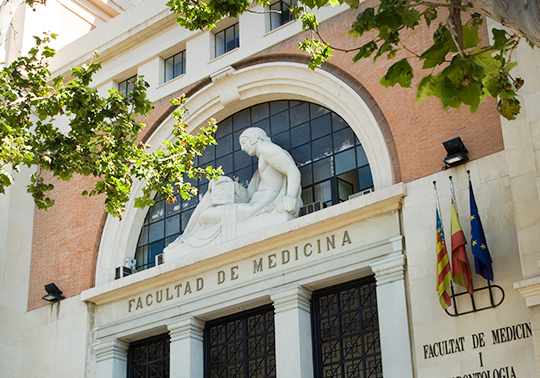Specialists from European countries analyse on Tuesday at the Universitat the survival of childhood cancer
- April 18th, 2016

The Universitat de València organises a scientific event ‘Diferencias y variaciones de supervivencia del cáncer infantil en países europeos de lengua latina’ (‘Differences and variations on survival rate of childhood cancer in European countries with Latin-based languages’), that will gather specialists in survival of childhood cancer from Italy, Portuga, France, Switzerland and Spain. The workshop will take place on Tuesday 19 April in the Faculty of Medicine and Dentistry.
During the conference, that will be inaugurated by the principal of the Universitat de València, Esteban Morcillo, and by the dean of the Faculty of Medicine and Dentistry, Federico Pallardó, epidemiologist and paediatric oncologists will deal with the differences in relation to the indicators of survival of childhood cancer in the European countries, the causes of this situation and they will propose cooperative international studies to identify the reason of these variations.
The workshop is organised by the Spanish Childhood Tumours Register, located at the Universitat de València, in collaboration with European experts of the RARECARENet (Information Network on Rare Cancers) y EUROCARE (European Cancer Registry), and it will have the participation of the Spanish Federation of Childhood Cancer Parents and the RTICC (Telematic Network of Cooperative Research on Cancer).
‘The survival rate of childhood cancer is a basic indicator of the recovery of these patients. All children with cancer should have the same expectations for curing, no matter which country they live in, but there is not the same survival rate in every country. And this is applicable to Europe, Spain and its neighbouring countries’, highlights Rafael Peris Bonet, full university professor of Medical Documentation of the Universitat de València and director of the Spanish Registration of Childhood Tumours (RETI-SEHOP).
The study EUROCARE about survival in Europe of diagnosed cases between 2000 and 2009 has shown that there are differences and deficiencies of survival between countries. Some important reasons of these differences of survival could be due the characteristics of childhood cancer assistance.
‘After the discover of these differences it is urgent that a group of experts (epidemiologists and paediatric oncologist), go in depth possible explications and propose the appropriate international cooperative studies to identify and make the casual factors of deficiency in childhood cancer survival in some countries appear’, indicates Rafael Peris.
GRELL International Congress
Conclusions and proposals of the workshop of Valencia will be exposed in the International Congress of the Group of Registry and Epidemiology of Cancer in Latin Speaking Countries (GRELL), which will be celebrated next May in Albi (France), in order to promoting necessary international cooperation.
In the meeting will participate experts in paediatric oncology and relevant from mentioned countries, responsible of the main cancer registers. Gemma Gatta, from the National Institute of Tumour, leader of RARAECARENet , and member of the Scientific Direction of EUROCARE, will open and close the work session.
Spanish Registration of Childhood Tumours
Spanish Registration of Childhood Tumours (RETI-SEHOP), which was created in 1980, is a scientist project to improve the assistance of children with cancer in Spain, trough the epidemiologist research of this illness and its causes. It is conducted by the professor Rafael Peris Bonet and located in the Faculty of Medicine and Dentistry of the Universitat de València. The RETI-SEHOP is the result of a long collaboration, since 1980, between the Spanish Society of Haematology and Paediatric Oncology (SEHOP) and the Universitat de València. This joint work was formalised on the April 2007 with a collaboration convene between both entities and nowadays it has the support of the Ministry of Health, Social Services and Equality (MSSSI).
The register counts with a national network of 46 reporting centres which includes all the units of paediatric oncology and haematology of Spain and has the support of national cancer registrations. Since it has a coverage if the 94% of the incident in childhood cancer, it is the information system or cancer register most completed of the country.
WORKSHOP PARTICIPANTS
Rafael Peris Bonet: Professor Medical Documentation, Faculty of Medicine, Universitat de València. Director, Spanish Childhood Cancer Registry (RETI-SEHOP). Universitat de València, Valencia, Spain.
Gemma Gatta: Evaluative Epidemiology Unit, Department of Preventive and Predictive Medicine, Fondazione IRCCS "Istituto Nazionale dei Tumori", Milano. RARECARE Net, Project Leader, EUROCARE Scientific Direction, Italy.
Laura Botta: Evaluative Epidemiology Unit, Department of Preventive and Predictive Medicine. Fondazione IRCSS “Istituto Nazionale dei Tumori”, Milano, Italy.
Ricardo Capocaccia: Evaluative Epidemiology Unit. Fondazione IRCSS “Istituto Nazionale dei Tumori”, Milano, Italy. RARECARE Net, planning and supervision. Former Director of Cancer epidemiology Unit, National Centre of Epidemiology, Istituto Superiore di Sanita, Italy.
Eva Ardanaz: Director, Cancer Registry of Navarre. Representative of REDECAN (Spanish Network of Cancer Registries), Spain.
Ana Miranda: Director, Oncologic Registration of south Portugal. Portuguese Institute of Oncology, Lisbon, Portugal.
Shelagh Redmond: Swiss Childhood Cancer Registry. University of Bern. Institute of Social and Preventive Medicine, Switzerland.
Josep Maria Borràs: Director of the Strategy on Cancer of the Ministry of Health of Spain. Director “Plan Director de Oncología de Cataluña”. Professor University of Barcelona. Principal Investigator of the Epidemiology and Prevention Program of the Spanish Cancer Research Network (RTICC), Spain.
Tomas Acha: President of the Spanish Society of Paediatric Haematology and Oncology. Chief of the Unit of Paediatric Oncology, Hospital Materno-Infantil Carlos Haya, Málaga, Spain.
Susana Ribes: Unit of Paediatric Haematology, Hospital Sant Joan de Dèu, Barcelona, Spain.
Gabriela Caldas: Oncologist, collaborator of the Oncologic Registration of south Portugal. Portuguese Institute of Oncology, Lisbon, Portugal.
Pediatric oncologist from Italy: Fondazione IRCSS “Istituto Nazionale dei Tumori”, Milano, Italy.
Pierluigi Brazzola: Senior Consultant of Paediatrics. Ospedale Regionale di Bellinzona e Valli, Ticino, Switzerland.
Jesús Mª González: President of ASPANION and Treasurer of the Spanish Federation of Parents of Children with Cancer, Spain.
File in: Facultat de Medicina i Odontologia , Deganats , Rectorat , Conferències i debats
















